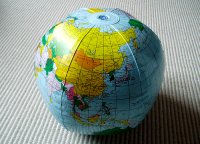International Economics is an exciting and dynamic subject that equips students with the tools with which to tackle important real-world issues in this age of globalisation and financial integration
Dr. Dimitra Petropoulou, University of Oxford

Image by stevecadman on Flickr
International Economics is the study of economic interactions between countries. It addresses many topical issues, such as:
How is the rapid growth of trade with China and India likely to affect the structure of production and wages in Europe? Why have trade negotiations in the Doha round of the WTO come to a standstill? Does this matter in the face of the rise of ‘regionalism’? What are the effects of European Monetary integration? How is the UK affected by its decision not to join the Euro? How does financial crisis spread across countries? What are the implications of the US sub-prime crisis and resulting credit crunch likely to be for the UK?
Broadly speaking, the field is split between the study of International Trade, which extends microeconomics to open economies, and International Finance, which employs macroeconomic analysis.
International Trade describes and predicts patterns of production, trade and investment across countries. It also looks at the effect that trade has on both the level and distribution of incomes within and across countries. It analyses different trade policies, the effects of ‘regionalism’ (regional trading blocs) and the potential effect of multilateral trade negotiations conducted by World Trade Organisation (WTO).
International Finance examines the effects of financial flows between countries. It looks at the effect of such flows on the balance of payments and the exchange rate. It also evaluates the implications of different exchange rate regimes and considers the appropriate role of international institutions such as the International Monetary Fund (IMF).
Students of International Economics can make use of the skills and tools learned in a wide range of career paths, such as journalism, consultancy, government agencies and international institutions, while at the same time enjoying the ability to make sense of some of the most important and complex issues of our times.
Web Links
VoxEU’s section on International Finance
VoxEU’s section on International Trade
VoxEU’s section on the Global Economy